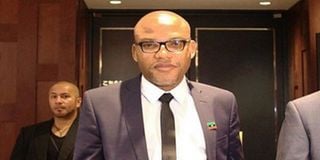Premium
IHRC clears Kenya, Nigeria of wrongdoing in Nnamdi Kanu saga

Nnamdi Kanu, leader of the Indigenous People of Biafra (IPOB), a Biafran separatist and Igbo nationalist organisation in Nigeria.
What you need to know:
- The commission said Kenya had no hand in the saga and also cleared it of rights violations in the arrest and repatriation to Nigeria of the leader of the Indigenous People of Biafra (IPOB).
The International Human Rights Commission (IHRC) has cleared Nigeria and Kenya of wrongdoing in the re-arrest and repatriation of fugitive Nigerian secessionist Nnamdi Kanu.
The commission said Kenya had no hand in the saga and also cleared it of rights violations in the arrest and repatriation to Nigeria of the leader of the Indigenous People of Biafra (IPOB), a Biafran separatist and Igbo nationalist organisation in Nigeria.
In a statement dated July 7 and released on July 13, the IHRC said it conducted an independent investigation after receiving 25 petitions on the Kanu saga, mostly from Nigerians, calling for an independent inquiry into human rights violations and possible breaches of established international and regional diplomatic protocols.
“The IHRC is committed to safeguarding the rights of citizens across the globe in line with the organization’s core mandate,” the Geneva-based agency noted.
No violations
IHRC said the investigation found there was no violation of Kanu’s human rights in the events leading to his re-arrest and repatriation to Nigeria.
"The commission, upon investigation, is unable to establish a case of human rights violation of Nnamdi Kanu in Kenya by the special police forces," it said in the statement.
“The commission is convinced that the Kenyan government played no official role in the events that led to Nnamdi Kanu’s arrest. The commission expects the Nigerian government to follow up the trial of Nnamdi Kanu in line with the country’s laws and respect to human rights.’’
The statement was signed by its Special Envoy for the Africa region, Mr Evans M. Mutavi, and the international president for Kenya.
The commission resolved to monitor Kanu's trial to ensure his rights are not violated by the Nigerian government.
What happened
Kanu, also a British citizen, jumped bail and fled to the UK in November 2017 while standing trial for a treasonable felony. He was re-arrested and repatriated to Nigeria on June 26 to continue with his trial.
Kanu was arraigned before the Federal High Court, Abuja, which remanded him in the custody of the secret police, Department of State Service (DSS) until July 26, when his trial would resume.
He had been standing trial for running an outlawed secessionist organisation, which was seeking to re-enact Biafra Republic that caused a three year civil war from 1967 to 1970..
The war caused the deaths of more than three million people in Nigeria’s South East.
Claims against Kanu
Meanwhile, Nigeria reported that it wrote a letter in April to Western diplomats on offences the secessionist leader committed.
Information and Culture minister Lai Mohammed said in the letter that Kanu orchestrated the killing of 60 persons and the destruction of property in 55 violent attacks across the South East and South South Zones, all within four months.
IPOB, he alleged, committed these atrocities before it established a militant group, the Eastern Security Network (ESN), on the alleged instruction of Kanu who was then in exile in the UK.
“With several of Kanu’s broadcasts from Europe, there were concerns in official quarters that some western countries were justifying IPOB’s violent acts under the guise of the group’s pursuit of self-determination.’’





